Eugene Volokh's Blog, page 227
November 13, 2024
[Josh Blackman] District Court Issues Universal Injunction In Louisiana Ten Commandments Case
Louisiana law requires the posting of the Ten Commandments in public school classrooms. A group of Plaintiffs challenged the ordinance. These Plaintiffs are faith leaders, parents, and others who object to the display of the Ten Commandments on Establishment Clause grounds.
The District Court ruled that the posting of the Ten Commandments was unconstitutional. I may address the First Amendment analysis elsewhere. Here, I'd like to focus on the scope of the court's remedy:
The Court has ruled that the Act is facially unconstitutional. That is, H.B. 71 is unconstitutional in all applications. As a result, the Act cannot be enforced throughout the state. While AG Defendants do not have to serve each school with a copy of this ruling, they certainly will be ordered to provide notice to all schools that the Act has been found unconstitutional, particularly since the burden on AG Defendants to accomplish this task is minimal.
Though this ruling only applies statewide, it is a universal injunction. It provides relief beyond the named plaintiffs, and their children. It applies to all schools in the state, even schools at which there were no objecting parents/plaintiffs. There is no certified class, so Rule 23 is out. Under Labrador v. Poe (see here and here), this universal injunction seems too broad. Relief should be targeted to those who are injured. This standard ought to apply in the state context, especially when it is a federal court granting relief.
This issue will be appealed to the Fifth Circuit shortly. Putting aside the merits question, the court may see fit to narrow the scope of relief.
The post District Court Issues Universal Injunction In Louisiana Ten Commandments Case appeared first on Reason.com.
[Josh Blackman] Today in Supreme Court History: November 13, 1856
11/13/1856: Justice Louis Brandeis's birthday.
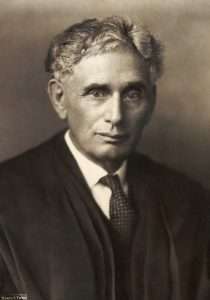 Justice Louis Brandeis
Justice Louis BrandeisThe post Today in Supreme Court History: November 13, 1856 appeared first on Reason.com.
November 12, 2024
[Ilya Somin] Courts Shouldn't Rely on Election Returns to Give Trump a Blank Check for Policies Motivated by Unconstitutional Discrimination
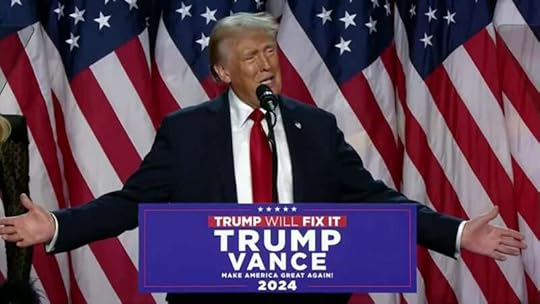
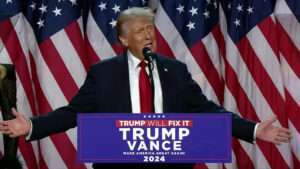 Donald Trump. (Fotogramma/Zuma Press/Newscom)
Donald Trump. (Fotogramma/Zuma Press/Newscom)
During Donald Trump's first administration, his travel ban policy barring almost all migration from several Muslim-majority nations was challenged in court on the grounds that it was unconstitutional because motivated by anti-Muslim bias. Co-blogger Josh Blackman argues similar arguments should not be accepted by courts in the next Trump administration because polling data indicates Trump made significant gains among Hispanic and Muslim voters in the 2024 election. Judges should not take his advice. The key issue in cases where seemingly neutral policies are challenged for having unconstitutional discriminatory motives is the motivation of the people who adopted them, not the backgrounds of the people who voted for them.
In the travel ban case, the main evidence against Trump was not who voted for him in the 2016 election, but his own repeated statements indicating that his intention was to target Muslims for exclusion, plus the extreme weakness of the supposed "security" rationales for the ban. This should have led courts to strike down the travel ban based on longstanding precedent holding that evidence of unconstitutional discriminatory motive (such as discrimination based on race, ethnicity, or religion) should lead to invalidation unless the government can show it would have adopted the same policy even in the absence of such illicit motivations. Ultimately, a closely divided 5-4 Supreme Court upheld the travel ban on the grounds that the executive deserves special deference on immigration policy that would not be extended in almost any other context. Elsewhere, I have argued this double standard is badly misguided. Be that as it may, no one on either side of that litigation argued the issue turns on survey data, election returns, or the ethnic and religious composition of the electorate that voted for Trump.
Voters are not the ones who adopt these policies. Moreover, the fact that a candidate has supporters from a given ethnic or religious group doesn't mean he cannot or will not adopt policies biased against them. He might, for example, do that to satisfy other (to him, more crucial) constituencies. Democrats, for example, routinely get strong support from Asian-Americans (far higher percentages than Trump got from Hispanics or Muslims in 2024), but also support various racial preferences that discriminate against them. Such voting patterns also don't necessarily show that members of the groups in question actually believe the candidate isn't biased against them. Many Hispanics and Muslims likely voted for Trump on "lesser evil" grounds, or because of anger at the Democrats at the state of the economy.
Of course, Josh Blackman's ultimate position may be that courts should ignore evidence of motive entirely. On that view, if a policy is facially neutral, it should be upheld, regardless of the possible motivations behind it.
In addition to going against many decades of precedent, that position would have terrible consequences. As I explained in a post written during the travel ban litigation:
If the Supreme Court rules that campaign statements cannot be considered, that would create a very dangerous precedent. Politicians could openly advocate discriminatory policies during the campaign, then rely on more careful and euphemistic phrasing after they take office. On the campaign trail, they can openly say they want to target blacks, Muslim, atheists, Evangelical Christians, or some other minority group. Afterward, they can adopt a policy targeting some seemingly neutral characteristic that closely correlates with membership in the group in question. And, after taking office, they can stick to carefully scripted official justifications for their actions that elide the true purposes.
I would add that one can use facially neutral criteria that correlate with group membership to target almost any racial, ethnic, or religious minority. Policymakers who seek to discriminate against blacks in hiring could reject applicants from majority-black neighborhoods or graduates of historically black colleges. As long as the policy in question doesn't explicitly reference race, but merely enumerates neighborhoods or colleges, you're in the clear! Want to exclude Orthodox Jews? Adopt a policy barring the hiring of people who refuse to work on Saturdays (the Jewish sabbath).
Clever policymakers can easily come up with similar facially neutral, but pretextual ways to target almost any minority group. Indeed, such strategies were repeatedly used by state and local governments to discriminate against blacks after the courts struck down open racially discriminatory policies.
It's worth noting that excluding evidence of discriminatory motive from judicial scrutiny would shield discriminatory policies condemned by the right, as well as those opposed by the left. For example, universities and selective public high schools with left-leaning administrations sometimes try to use facially neutral admissions criteria to to keep down the percentage of Asian and white students [my wife, Alison Somin, was one of the lawyers representing the Asian-American plaintiffs challenging one such policy, in a case that almost reached the Supreme Court]. If evidence of motive is excluded, educational institutions would have a virtual blank check to use seemingly neutral criteria to get around the Supreme Court's 2022 decision barring most racial preferences in college admissions.
Indeed, defenders of such preferences could adopt Josh Blackman's election-returns argument. After all, the left-wing Democrats who enact these policies often win majorities of Asian voters, and they get large percentages of the white vote, too, even if a minority. Many of the relevant policymakers are even whites or Asians themselves.
In the travel ban case, the Supreme Court ultimately did not rule that campaign statements or other evidence of discriminatory motivation should be ignored. Instead, as noted above, it based its ruling on the supposed special deference due to the executive on immigration policy. That was a bad ruling. But a holding indicating that evidence of discriminatory motive is barred more generally would have been much worse.
In sum, election returns should not influence judicial evaluations of possibly discriminatory policies. If such cases arise in the second Trump administration, as they did in the first, the focus should be on motives of the officials who actually adopted the policy in question.
The post Courts Shouldn't Rely on Election Returns to Give Trump a Blank Check for Policies Motivated by Unconstitutional Discrimination appeared first on Reason.com.
[Ilya Somin] The Election Wasn't a Realignment—or a "Mandate"

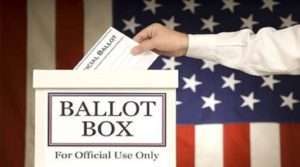 (NA)
(NA) There is a lot of talk about how the election result is a great realignment and/or a "mandate" for Trump's policies. The available evidence doesn't support such notions.
When all votes are fully counted, it looks like Trump will have won the popular vote by 1.5 points and have 1-4 point margins in the 7 swing states. That's not the kind of large margin of victory typically associated with realignment elections in which large blocs of voters shift from one party to another (e.g. 1932 or 1980). It's actually a narrower victory than Bush won in 2004 or Obama in 2012. Few would argue either of those wins was a realignment or a mandate. Biden in 2020 won the popular vote by a bigger margin (about 4.5 points) and had nearly the same electoral vote margin (306 for Biden in 2020; 312 for Trump this year). For those keeping score, I wrote at the time that Biden didn't have a mandate either. Trump's popular vote margin may actually be a little smaller than Hillary Clinton's was in 2016 (yes, obviously, she lost the electoral college).
House and Senate results are consistent with the above. The GOP will have only a narrow House majority (probably about 220-215). The Republicans gained only 4 seats in the Senate, despite a very favorable map, and actually lost 4 of 5 swing-state Senate races, despite Trump winning all five of those states on the top of the ballot.
Around the world, there has been a big backlash against incumbents because of inflation/price increases. As I noted in a preelection post, this is standard "retrospective voting" (punishing incumbents for perceived bad conditions), and it was weighing heavily against the Democrats. The others who faced elections all got clobbered or are about to be. The Democrats actually greatly outperformed these background conditions by losing only narrowly.
It is true there has been a bigger shift in the Hispanic vote than elsewhere. Exit polls suggest Trump lost it by only about 53-45 (some polling data shows a weaker performance for Trump). However, that means he got about the same share of the Hispanic vote as….. George W. Bush in 2004—the last time the GOP ran a presidential campaign with this highly favorable background conditions.
Also, it has long been clear that Hispanic identity is highly fluid and diverse, and therefore that the group is far less politically monolithic than, e.g., blacks. Many second and third generation Hispanics don't even identify as "Hispanic" or Latino on surveys. It's possible the GOP will be more competitive for Hispanic votes from now on. But even that would be something of a continuation of possible preexisting trends. This fluidity of the Hispanic vote undercuts the validity of both left-wing hopes of building a dominant coalition based on "woke" identity politics and right-wing paranoia about a "great replacement."
I do recognize that the election result is painful and disappointing for those (emphatically including me!) who hoped Trump's awfulness and that of the MAGA movement generally would enable Kamala Harris to overcome the background conditions and win. These factors did likely help keep the election close, however. The Democrats only lost narrowly, and did not get massively clobbered like most other incumbent parties buffeted by post-pandemic inflation and price increases.
The narrowness of the victory and the major role of anti-incumbent economic "retrospective" voting also undercuts claims that Trump has a "mandate" for his policies, in the sense that the election indicates there is strong majority public support for them. Preelection survey data on policy actually indicates most of his policies were actually less popular than those of the Democrats.
Some political scientists reject the entire notion of a mandate, arguing the idea is incoherent and not supported by evidence. I myself have long argued that a policy's popularity says little about whether it is right or just. Many good policies are highly unpopular, and terrible ones sometimes win majority support. Think, e.g, of widespread public support for slavery and racial discrimination throughout much of American history. Thus, I would oppose much of Trump's agenda, regardless of whether he has a "mandate" or not. But for those who believe mandates exist, and give them more normative weight than I do, it's worth noting there was no such mandate in this election.
None of this proves that the Democratic Party has optimal issue positions or that Kamala Harris was a great candidate. Neither is true. They do have some unpopular positions (e.g.—on various "woke" issues). And Harris surely had a variety of flaws. But the same is true of the Republicans and Trump (who, unusually for a winning presidential candidate, has a highly negative approval rating that is about 8 points underwater). If not for inflation and price increases, above, the Democrats would have won relatively easily, despite their very real weaknesses on some issues.
In post-election analyses, it's typical for pundits to say the losing party would do better if only they adopted more of the commentator's own positions. Not me! I know all too well that I have many unpopular views. I'm the guy who wrote a book that explains why political ignorance and bias lead majorities of voters to hold positions that are badly wrong on many issues. There and elsewhere, I also highlighted flawed "retrospective voting" of the kind that played a big role in the Democrats' defeat above (blaming incumbents for bad conditions even if they didn't cause them, and voting for policies that may actually make them worse, as Trump's tariff and immigration policies will with prices).
I readily admit that a party that ran on a platform adopting all my views would get clobbered. But that fact doesn't prove the 2024 was a mandate or a realignment.
The post The Election Wasn't a Realignment—or a "Mandate" appeared first on Reason.com.
[David Post] More Rock and Roll, From My "Commonplace Book"
This is #8 in a very occasional series plucked from my files of quotes and snippets and what-have-you. I've spent a lot of time over the last year or so immersed in the early history of rock-and-roll, both because I find it inexhaustibly fascinating [a shout-out to Andrew Hickey's stupendous "History of Rock Music in 500 Songs" podcast] and because I'm thinking of writing something "serious" about the way that several arcane provisions of US copyright law affected the structure and development of the music industry in the '40s and '50s. So this post, and probably others into the future, will be full of rockandroll-iana.
Jerry Leiber and Mike Stoller started writing songs together as teenagers, two East Coast Jewish music nerds recently transplanted with their families to Los Angeles. They had their first (of many) #1 hits before either turned 20 years old—"Hound Dog," recorded in 1953 by Big Mama Thornton (and by many, many others in subsequent years). They went on to become one of the most successful songwriting duos in the early years of rock-and-roll, with a long string of mega-hits (Jailhouse Rock, Stand By Me, On Broadway, There Goes My Baby, Love Potion #9, Yakety-Yak . . .) to their credit.Stoller was the better technical musician of the two, a talented classically-trained pianist (a big Bartok fan, apparently) whose true passion was jazz and rhythm-and-blues. He was able to persuade the great jazz pianist James P. Johnson to give him lessons in stride/boogie-woogie piano, a style that Johnson himself had basically invented back in the 1910s and 20s, and which Johnson had taught to, among others, Fats Waller and Willie ("The Lion") Smith, and whose influence on a whole generation of great jazz pianists is impossible to overstate.
Stoller later said: "It was as if Beethoven were giving me lessons — except that, unlike James P. Johnson, Beethoven had never given lessons to Fats Waller."
2. Rock Around the Clock
I always thought Bill Haley was a lucky one-hit wonder who stumbled onto his 1955 megahit by chance. Wrong, wrong. Haley was a hard-working pro; he and his band (the "Comets") had a #1 hit in 1953 with "Crazy Man Crazy," and they worked hard to find the next big thing. Haley had a day job as a DJ at a local radio station in southeast PA, which meant not only that he heard pretty much everything that was being recorded at the time, but also that the band had access to an empty studio they could use after closing hours to work on their songs. And because the station had (primitive) tape equipment, they could record themselves and listen to what they had come up with—an almost unheard-of luxury for a 50s band. They did dozens of shows, for free, at local high schools; Haley wanted to see what kind of songs teenagers were getting into, and he would constantly change the band's set-list as they watched what the kids reacted to.
The original version of Rock Around The Clock was recorded and released in 1953 by "Sonny Dee and his Knights." The record flopped, but Haley heard it and wanted to work up a cover version; his producer at the small record label he was signed to (Essex Records), however, didn't like the song and wouldn't let the band record it, going so far as to tear up the sheet music in the studio when Haley brought it in for a recording session. But in 1954 Haley signed with Decca, and got to work with their star producer, the legendary Milt Gabler (Billy Crystal's uncle, as it happens), who had worked with Billie Holiday, Big Joe Turner, Lionel Hampton, Louis Jordan, Louis Armstrong, and other R&B and jazz giants.
Gabler, it turned out, wasn't too crazy about the song either, but he let the band record it and Decca released it in 1954 as the B-side (!!) to a pretty dopey novelty song, "One Man (and 13 Women Around)." Sales were disappointing—it almost (but not quite) made it into the top 50 on the Billboard Pop chart.
That would've been that, but the following year (1955) Richard Brooks, who was directing the film "Blackboard Jungle," asked Peter Ford, the teenage son of the lead actor in the film, Glenn Ford, to bring some of his favorite records to the movie set so Brooks could listen to them. Brooks wanted to hear what kind of music real teenagers were listening to (as opposed to the fictional teenagers in his movie, who were portrayed as swing jazz fanatics) so he could include some in his film in hopes of getting teenagers to come to the theater. He chose Rock Around the Clock, using the entire recording, start to finish, as background over the opening credits.
Mass hysteria ensued across the land. It was an early version of Beatlemania, but in movie theaters rather than live shows, and the kids weren't screaming like banshees, they were jumping up and down in their seats and dancing in the aisles. Theater owners in several cities had to call in the cops to quell it all, those old movie theater seats not having been engineered to withstand the pounding of teenagers jumping up and down on them.
Frank Zappa was one of those kids, and he had a very interesting observation about what made the whole thing so incredible:
"I remember going to see Blackboard Jungle. When the titles flashed up there on the screen, Bill Haley and his Comets started belting out 'One, Two, Three O'Clock, Four O'Clock Rock…' It was the loudest rock sound kids had ever heard at the time. I remember being inspired with awe. In cruddy little teen-age rooms, across America, kids had been huddling around old radios and crappy transistor radios and cheap record players listening to their 'dirty music.' ("Go in your room if you wanna listen to that crap…and turn the volume all the way down".) But in the theatre watching Blackboard Jungle, they couldn't tell you to turn it down. I didn't care if Bill Haley was white or black, phony or sincere…he was playing the Teen-Age National Anthem, and it was so LOUD we were all jumping up and down."
It went on, incidentally, to sell 25 million records.
If you haven't heard it in a while—or have never heard it (is such a thing possible?)—the original recording is here. Worth hearing, if only for Marshall Lyttle's fantastic slap-back bass and Danny Cedrone's terrific guitar solo.
The post More Rock and Roll, From My "Commonplace Book" appeared first on Reason.com.
[Josh Blackman] Part VIII: Equal Protection of the Law—Discrimination on the Basis of Race
 Brown v. Board of Education (1954)
Brown v. Board of Education (1954)  Bolling v. Sharpe (1954)
Bolling v. Sharpe (1954)  Cooper v. Aaron (1958)
Cooper v. Aaron (1958)  Loving v. Virginia (1967) Affirmative Action on the Burger and Rehnquist Courts
Loving v. Virginia (1967) Affirmative Action on the Burger and Rehnquist Courts  Regents of the University of California v. Bakke (1978)
Regents of the University of California v. Bakke (1978)  Gratz v. Bollinger (2003)
Gratz v. Bollinger (2003)  Grutter v. Bollinger (2003) Affirmative Action on the Roberts Courts
Grutter v. Bollinger (2003) Affirmative Action on the Roberts Courts  Fisher v. University of Texas at Austin I (2013)
Fisher v. University of Texas at Austin I (2013)  Fisher v. University of Texas at Austin II (2016)
Fisher v. University of Texas at Austin II (2016) The post Part VIII: Equal Protection of the Law—Discrimination on the Basis of Race appeared first on Reason.com.
[Sasha Volokh] "Mesaĝo en botelo," a Short Film in Esperanto
I just made a new Esperanto film, which I've submitted to an Esperanto film festival (the 6th American Good Film Festival). (It's really short: under five minutes long. And don't worry: it has English subtitles.) It's called "Mesaĝo en botelo," or "Message in a bottle." My kids (and a couple of others) have acting or voice roles in it, and my twelve-year-old son Mark did the video editing. You might remember my Esperanto film from last year, "Honesta homo" ("An honest person"), which was about Diogenes.
I'm embedding the film below, but most importantly, please click through to YouTube and "like" ("thumbs-up") the video there: "audience favorite" gets a special prize in this film festival! Voting finishes on Monday, so please do it now.
(I don't think you can "like" a YouTube video when you watch it on this blog: click on the title at the top of the video to open it in YouTube.)
Thanks to Catie Neilson, the host of this year's festival, and Alex Miller, former vice president of Esperanto USA and indefatigable longtime organizer of this film festival for the previous five years. Click here to see the full set of films submitted to the festival. (Alex also organizes the local Atlanta Esperantist scene—if you find Esperanto interesting and are in the Atlanta area, let me know and I'll hook you up.)
Esperanto is the most popular of the constructed languages (and has been around longer than Klingon, Elvish, and High Valyrian), is extremely easy to learn, and is even easier to learn these days now that there's an Esperanto course on Duolingo. (Back in 1997-98, I had to learn it using a book. Now, I've finished the Esperanto and Klingon courses on Duolingo.) The film reflects that I visited Esperantists earlier this year in Białystok, Poland, where Ludwik Zamenhof, the guy who founded the language in the 1870s-80s, was born; and I might go to the world congress next year in Brno.
And remember, please click through to YouTube and "like" my video (and spread the word)!
The post "Mesaĝo en botelo," a Short Film in Esperanto appeared first on Reason.com.
[Josh Blackman] Today in Supreme Court History: November 12, 1975
11/12/1975: Justice William O. Douglas resigns.
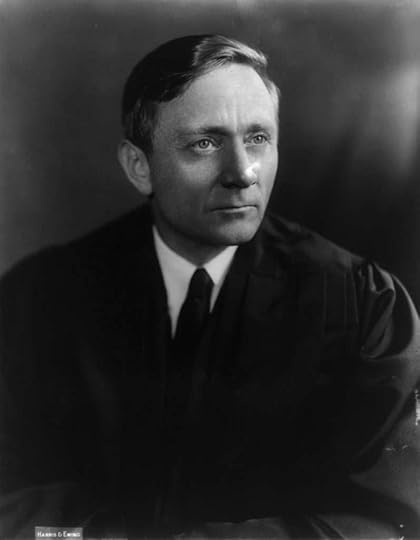 Justice William O. Douglas
Justice William O. DouglasThe post Today in Supreme Court History: November 12, 1975 appeared first on Reason.com.
November 11, 2024
[Eugene Volokh] Monday Open Thread
The post Monday Open Thread appeared first on Reason.com.
[Eugene Volokh] Harris On Track for ~76M Votes, Trump for ~78.3M Votes (a Swing of ~4M to ~5M from Biden-Trump 2020)
The N.Y. Times reports that about 95.0% of all votes have been counted, with Harris at 71.7M and Trump at about 75M:

These 95.0% amount to 148.8M, so that means there are about 7.8M uncounted (that's 148.8M / 0.95 * 0.05), for a total number of about 156.6M. (All numbers are approximations.)
Most of those not yet counted votes are in California (4.2M there, since 25% of the votes there remain uncounted); quite a few are from Oregon, Washington, Arizona, Utah, and Colorado. These on balance tilt Democrat; so far California and Washington have split roughly 60-40 Democrat, though the other states are closer to 50-50 (and Utah has been splitting 60-40 Republican). This suggests that the 7.8M will split roughly 4.3M Harris to 3.3M Trump or thereabouts. Put together that means a likely final total of roughly 76M Harris and 78.3M Trump or so, give or take a few hundred thousand. (Maybe 2.3M or a bit more will go to third-party candidates.)
Again, when thinking about the 2020-to-2024 vote gulf, it's important to compare the 2020 final results with projected 2024 final results (or just wait until the 2024 final results are in), rather than 2020 final results with early 2024 results.
The post Harris On Track for ~76M Votes, Trump for ~78.3M Votes (a Swing of ~4M to ~5M from Biden-Trump 2020) appeared first on Reason.com.
Eugene Volokh's Blog
- Eugene Volokh's profile
- 7 followers



